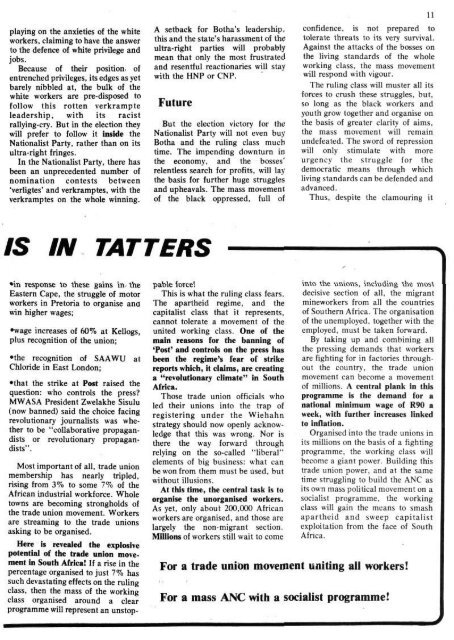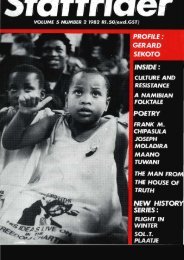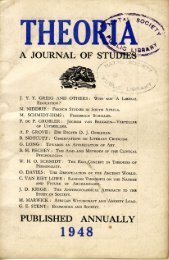Inqaba ya basebenzi Number 2 April 1981 - DISA
Inqaba ya basebenzi Number 2 April 1981 - DISA
Inqaba ya basebenzi Number 2 April 1981 - DISA
Create successful ePaper yourself
Turn your PDF publications into a flip-book with our unique Google optimized e-Paper software.
playing on the anxieties of the white<br />
workers, claiming to have the answer<br />
to the defence of white privilege and<br />
jobs.<br />
Because of their position, of<br />
entrenched privileges, its edges as yet<br />
barely nibbled at, the bulk of the<br />
white workers are pre-disposed to<br />
follow this rotten verkrampte<br />
leadership. with its racist<br />
rallying-cry. But in the election they<br />
will prefer to follow it Inside the<br />
Nationalist Party, rather than on its<br />
ultra-right fringes.<br />
In the Nationalist Party, there has<br />
been an unprecedented number of<br />
nomination contests between<br />
'verligtes' and verkramptes, with the<br />
verkramptes on the whole winning.<br />
A setback for Botha's leadership,<br />
this and the state's harassment of the<br />
ultra-right parties will probably<br />
mean that onlv the most frustrated<br />
and resentful reactionaries will stay<br />
with the HNP or CNP,<br />
Future<br />
IS IN TATTERS<br />
•in response to these gains in the<br />
Eastern Cape, the struggle of motor<br />
workers in Pretoria to organise ana<br />
win higher wages;<br />
•wage increases of 60% at Kellogs,<br />
plus recognition of the union;<br />
•the recognition of SAAWU at<br />
Chloride in East London;<br />
•that the strike at Post raised the<br />
question; who controls the press?<br />
MWASA President Zwelakhe Sisulu<br />
(now banned) said the choice facing<br />
revolutionary journalists was whether<br />
to be "collaborative propagandists<br />
or revolutionary propagandists".<br />
Mosi important of all, trade union<br />
membership has nearly tripled,<br />
rising from 3% to some 7% of the<br />
African industrial workforce. Whole<br />
towns are becoming strongholds of<br />
the trade union movement. Workers<br />
are streaming to the trade unions<br />
asking to be organised.<br />
Here Is revealed the explosive<br />
potential of the trade union movement<br />
in South Africa! If a rise in the<br />
percentage organised to just 7% has<br />
such devastating effects on the ruling<br />
class, then the mass of the working<br />
class organised around a clear<br />
programme will represent an unstop<br />
But the election victory for the<br />
Nationalist Party will not even buy<br />
Botha and the ruling class much<br />
time. The impending downturn in<br />
the economy, and the bosses'<br />
relentless search for profits, will lay<br />
the basis for further huge struggles<br />
and upheavals. The mass movement<br />
of the black oppressed, full of<br />
pable force!<br />
This is what the ruling class fears.<br />
The apartheid regime, and the<br />
capitalist class that it represents,<br />
cannot tolerate a movement of the<br />
united working class. One of the<br />
main reasons for the banning of<br />
'Post' and controls on the press has<br />
been (he regime's fear of strike<br />
reports which, it claims, are creating<br />
a "revolutionary climate" in South<br />
Africa.<br />
Those trade union officials who<br />
led their unions into the trap of<br />
registering under the Wiehahn<br />
strategy should now openly acknowledge<br />
that this was wrong. Nor is<br />
there the way forward through<br />
relying on the so-called "liberal"<br />
elements of big business; what can<br />
be won from them must be used, but<br />
without illusions.<br />
At this time, the central task is to<br />
organise the unorganised workers.<br />
As yet, only about 200,000 African<br />
workers are organised, and those are<br />
largely the non-migrant section.<br />
Millions of workers still wait to come<br />
11<br />
confidence, is not prepared to<br />
tolerate threats to its very survival.<br />
Against the attacks of the bosses on<br />
the living standards of the whole<br />
working class, the mass movement<br />
will respond with vigour.<br />
The ruling class will muster all its<br />
forces to crush these struggles, but.<br />
so long as the black workers and<br />
youth grow together and organise on<br />
the basis of greater clarity of aims,<br />
the mass movement will remain<br />
undefeated. The sword of repression<br />
will only stimulate with more<br />
urgency the struggle for the<br />
democratic means through which<br />
living standards can be defended and<br />
advanced.<br />
Thus, despite the clamouring it<br />
into the unions, including ihe most<br />
decisive section of all, the migrant<br />
mineworkers from all the countries<br />
of Southern Africa. The organisation<br />
of the unemployed, together with the<br />
employed, must be taken forward.<br />
By taking up and combining all<br />
ihe pressing demands that workers<br />
are fighting for in factories throughout<br />
ihe country, the trade union<br />
movement can become a movement<br />
of millions. A central plank in this<br />
programme is the demand for a<br />
national minimum wage of R90 a<br />
week, with further increases linked<br />
to Inflation.<br />
Organised into the trade unions in<br />
its millions on the basis of a fighting<br />
programme, the working class will<br />
become a giant power. Building Ihis<br />
trade union power, and at the same<br />
time struggling to build the ANC as<br />
its own mass political movement on a<br />
socialist programme, the working<br />
class will gain the means to smash<br />
apartheid and sweep capitalist<br />
exploitation from the face of South<br />
Africa.<br />
For a trade union movement uniting all workers!<br />
For a mass ANC with a socialist programme!
















